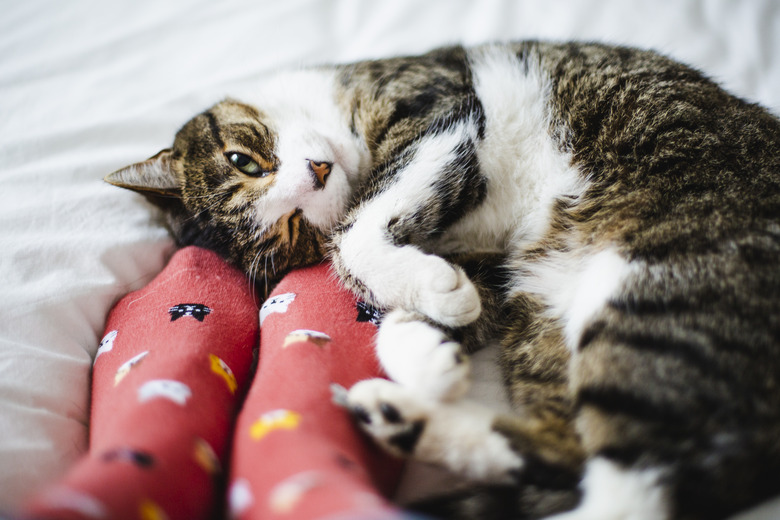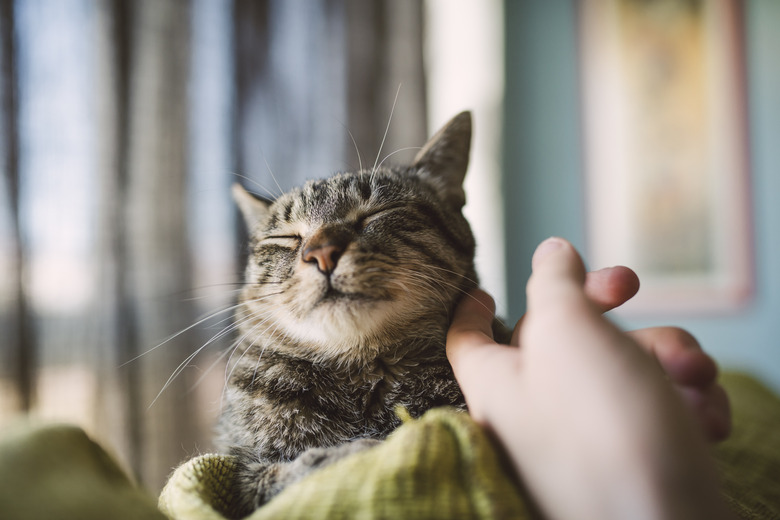My Cat Is Gnawing On My Fingers
If you find your kitty gnawing on your fingers, it could be a playful gesture, a throwback to kittenhood, or an act of aggression. Identifying what's behind the kitten nibbling on hand can help you take appropriate action to curb the unwanted behavior. If gnawing progresses to biting, a trip to a vet or cat behavioralist may be in order.
Kitten nibbling on hand
Kitten nibbling on hand
A young kitten's gnawing could be a way to soothe sore gums irritated by teething. Your kitty may view you as a mother substitute and chew in the same way she used to nurse from her mother, or play bite with her litter mates. Kitten biting fingers can be cute when the cat is very young, but can become a learned behavior that the cat may carry into adulthood. Curtail the behaviors when they start, no matter how cute they may be, or you'll have a tougher time down the line. When gnawing starts, give your kitty something more appropriate to chew, like a toy, and walk away and ignore her if she won't be deterred.
Playful fun and games
Playful fun and games
Your cat may enjoy the play biting and finger gnawing because it means fun, interactive time with you. If you've encouraged the behavior in the past, or allowed it to go on and engaged in a positive way, you've reinforced the idea that it's a good thing. Transition to other forms of interactive play with your cat, such as with a feather dancer, laser pointer, or string.
Keep your fingers away from her mouth when grooming or petting, and walk away when she starts to bite. Avoid toys that encourage playing with or biting at your fingers. Believe it or not, sometimes a kitting biting fingers means that the cat doesn't want you to stop petting her or giving her attention.
Kitty may be stressed out
Kitty may be stressed out
Cats can become stressed or develop obsessive-compulsive disorders, such as incessant gnawing or chewing. This typically occurs with changes in the household or stressors in the environment. Try to maintain a regular schedule for your cat to reduce the potential for this problem through regular mealtimes, a balanced diet, and a clean litter box. Make sure kitty is comfortable around other pets, human household members, and guests. If she prefers to be alone, be certain she has a place she can call her own to escape from stressors.
Your hands smell good
Your hands smell good
Your cat may be chewing your fingers because they smell or taste good. Always wash your hands thoroughly, particularly after preparing pungent-smelling foods — and especially cat food. Use unscented hand creams and lotions to deter unwanted gnawing as well. If your cat bites at your fingers when you offer treats by hand, stop feeding her by hand altogether, and feed only from her bowl.
Go see a professional
Go see a professional
Playful gnawing and nips can turn to biting if left unchecked. While it's best to address early behaviors before they reach more aggressive levels, your cat can be retrained. Bring the gnawing activity to your vet's attention so they can rule out any underlying medical or health issues that could be promoting the action. Consider consulting a pet behaviorist to help you get to the underlying cause of the problem.

